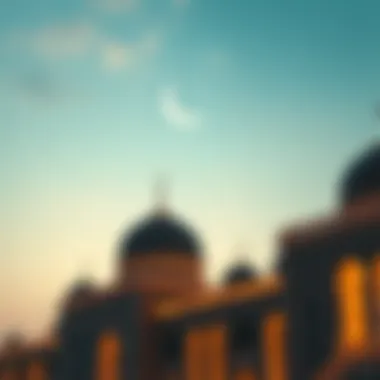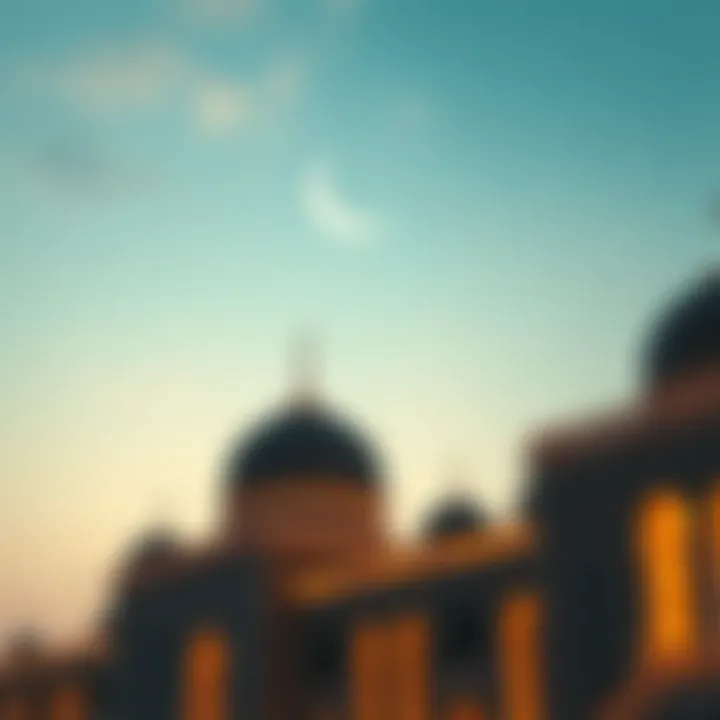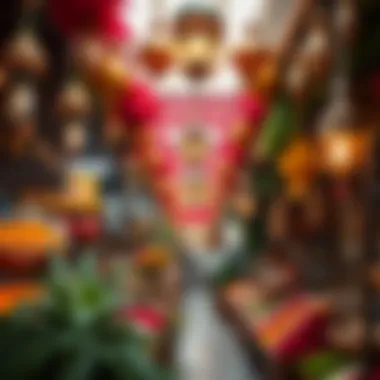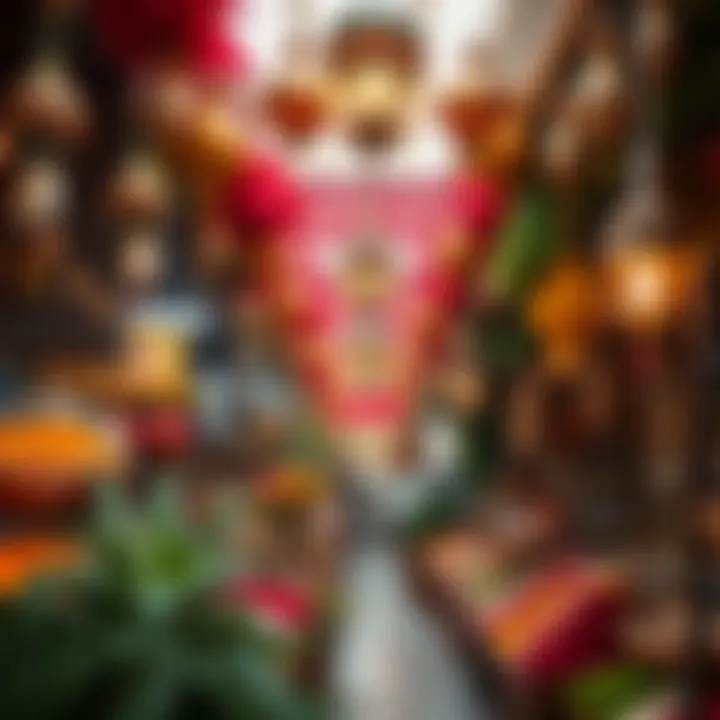Understanding Ramadan's Significance in the UAE


Intro
Ramadan, a month steeped in spirituality and community, holds a unique position in the cultural fabric of the United Arab Emirates. The significance of this holy month transcends mere fasting; it's a time for reflection, charity, and social cohesion. For those living in or visiting the UAE, understanding the nuances of Ramadan, especially its commencement, is crucial.
The start of Ramadan is determined by the sighting of the new moon, often leading to uncertainty about the exact date. For many, this can mean adjusting their schedules, breaking their routines, and considering the influence this period has on daily life and business practices. Consequently, it also has implications for the property market, where changes in lifestyle can shift demand and preferences.
In this article, we will explore the dynamics surrounding the start of Ramadan in the UAE and its wider impact on social norms, investment strategies, and community interactions. This understanding is vital for homebuyers, investors, agents, and expats who seek to navigate this transformative period gracefully. Let's embark on this journey to uncover how Ramadan shapes our interactions and environment in the UAE.
Preface to Ramadan
Ramadan holds immense significance not only as a month of fasting but also as a time steeped in cultural, social, and spiritual values. In the United Arab Emirates (UAE), the arrival of this holy month sparks a host of traditions and practices that bind communities together and foster a deeper sense of cooperation and respect among its diverse population. Understanding Ramadan's essence helps to grasp how it influences daily life, from community gatherings to culinary delights and real estate market dynamics.
The importance of exploring Ramadan goes beyond mere observance; it invites one to delve into its historical roots and the profound meanings it entails. As the sun rises each day, setting the rhythm for the month's fasting, the country transforms into a tapestry woven with shared experiences and acts of generosity. The spirit of Ramadan cultivates an atmosphere of reflection and self-improvement, making it essential for anyone living in or entering the Emirates to understand its implications.
Through this examination, readers will gain insight into the rituals, historical significance, and the manner in which the start of Ramadan is determined, all contributing factors to the unique atmosphere that envelops the UAE during this sacred month.
Historical Perspective
The origins of Ramadan trace back to the 7th century when Islamic tradition holds that the Quran was first revealed to Prophet Muhammad. This event imbues the month with a sense of spiritual renewal and significance, prompting Muslims to practice fasting as a form of penance and self-discipline. Over centuries, this observance has evolved, but its core tenets remain the same, rooted in historical context and traditional teachings.
In the UAE, Ramadan is celebrated with much enthusiasm, an echo of historical Islamic practices that have engrained within the local culture. The unique historical blend of Islamic traditions and local customs culminates in a distinct atmosphere each year, especially as the community embraces both its heritage and modernity. The UAE’s strategic location as a crossroad of cultures, especially between East and West, provides an interesting layer to how Ramadan is celebrated, often integrated with various cultural influences that reflect the expatriate lifestyle.
Global Observance
Ramadan is not confined to the borders of any single nation; it is observed globally, as Muslims from diverse backgrounds come together to participate in this sacred month. The way it is marked can vary significantly from one country to another—each with its own customs and unique flavors, yet all share the common thread of fasting from sunrise to sunset.
In countries like Indonesia and Turkey, the observance includes communal prayers and lavish meals after sunset. Meanwhile, in the UAE, the Iftar (the meal to break the fast) often features dates and water, followed by a diverse array of dishes influenced by the country’s rich culinary mix. This global aspect of Ramadan highlights not just the religious significance but also a cultural unification that transcends borders.
The essence of Ramadan therefore lies in its ability to bring people together, irrespective of their backgrounds, creating a shared experience that encompasses joy, unity, and respect. Basking in this sacred month, communities worldwide discover deeper connections and mutual understanding, reminding each other that the spirit of Ramadan embodies more than just fasting—it represents mercy, reflection, and community.
Significance of Ramadan
Ramadan holds a paramount place not just in the calendar year for Muslims, but also in the cultural fabric of the UAE. Different from mere abstinence from food and drink, the significance of Ramadan extends deep into the realms of spirituality, community, and social responsibility. This is a time when traditions flourish and values are strengthened, affecting every layer of daily life and even influencing sectors such as real estate.
The month serves as a period of self-examination, where individuals seek to connect more profoundly with their faith and community. The practice of fasting is a way to experience empathy for those who are less fortunate—reminding many that wealth carries a social responsibility.
Spirituality and Reflection
The spiritual aspect of Ramadan invites a plethora of practices. During this month, many Muslims turn to prayer, reading of the Quran, and personal reflection. Fasting, known as sawm, is not merely about refraining from food; it serves as a filter for the mind, body, and spirit. Participants often engage in acts such as increased charity, or zakat, and late-night prayers called Taraweeh. The atmosphere is laden with a sense of tranquility and heightened consciousness of divine presence.
Community Connection
Beyond individual reflection, Ramadan fosters communal bonds. Families, friends, and neighbors gather for Iftar, the meal breaking the fast each evening. It’s not uncommon for families to prepare extra portions of food, relishing in sharing meals with those in their neighborhood or even extending invitations to those less fortunate. The initiative to provide meals or food baskets during this month showcases the spirit of generosity that defines this holy time.
The observance of Ramadan also transcends religious divides, drawing various cultures together in celebration. Ramadan communities in the UAE are often rich with diversity, as you find people from a multitude of backgrounds engaging in the rituals associated with this sacred month.
"Ramadan is not just about fasting; it's a comprehensive lifestyle change where spiritual and community values intersect."
In preparation for Ramadan, local mosques and community centers often arrange programs that focus on education and understanding of its significance. Workshop sessions, Quran recitations, and events to educate the young about the importance of Ramadan not only promote a deeper understanding among the youth but also ensure the values of charity and community connection are carried forward.
Thus, the significance of Ramadan cannot be overstated. It shapes aspects of daily life in the UAE, intertwining the spiritual with the social, and demonstrating the power of community empathy and support across diverse backgrounds. This inextricable relationship between spirituality and community makes Ramadan a unique facet of life in the UAE.
Determining the Start of Ramadan


Understanding when Ramadan begins is vital for Muslims around the globe, especially in the UAE. This particular month signifies not just a time of fasting but also a period of spiritual rejuvenation and communal harmony. Knowing the precise start date allows individuals and families to prepare both spiritually and practically. From adjustments in schedules to planning communal meals, the implications of the Ramadan start date are far-reaching. Moreover, the UAE, with its multicultural landscape, witnesses a blend of traditional observances, all hinging on this critical determination.
The Role of Astronomy
Astronomy plays a significant role in the determination of the start of Ramadan. The Islamic calendar is lunar-based, which means that each month begins with the sighting of the new moon. In the UAE, astronomers and religious authorities closely monitor the lunar cycle in the days leading up to Ramadan. This careful observation involves checking for the moon's visibility on the 29th day of Sha'ban, the month preceding Ramadan. If the new moon is sighted, Ramadan begins the next day. If not, it will start the following day, marking a seamless transitions between the lunar months.
This method not only connects the practice with astronomical science but also reflects the deep roots of Islamic tradition.
“The knowledge of the stars is a lamp for the traveler.”
Using astronomical tools, experts predict the moon's appearance, allowing for better planning. This practice often means that the start of Ramadan can be known even a day or two in advance, helping communities prepare for worship and fasting.
Factors Influencing Moon Sighting
- Geographic location significantly shapes moon observation. Factors such as atmospheric conditions and local horizons can determine clarity.
- Traditional practices embedded in the community affect how people perceive sightings. Local customs might override scientific methods in some cases.
The confluence of astronomy and community traditions highlights the profound importance of celestial bodies in Islamic life, connecting every faithful to the heavens.
Official Announcements
Once the new moon sighting is confirmed, official announcements declare the start of Ramadan. In the UAE, this announcement typically comes from the Islamic Affairs and Charitable Activities Department. It’s a central authority that ensures that all communities, regardless of their diverse backgrounds, receive timely updates regarding the beginning of Ramadan.
This public announcement is crucial for social alignment. It ensures that everyone is on the same page and ready to embark on this communal journey of fasting and prayer. Generally, these announcements are made through various outlets:
- National media broadcasts across television and radio stations.
- Social media platforms, where instant communication is vital.
- Messages from mosques, which serve as community hubs for many.
These platforms create a cohesive rhythm in the community. When the call to Ramadan is made, families gather for evening prayers. Conversations blossom over shared meals, and the spirit of togetherness is rekindled. This seamless transition from Sha'ban to Ramadan should not be underestimated; it marks not just the start of fasting, but the beginning of a journey towards reflection and growth.
As the moon waxes, so does the communal spirit in the UAE; the entire nation prepares to embrace the blessings of Ramadan together, resulting in a richer experience for all involved.
Ramadan Practices in the UAE
Ramadan in the UAE is a time woven with rich traditions, making it an intriguing period for the local populace and expats alike. Practices during this holy month provide deeper insights into community values and individual reflections. Understanding these practices reveals how Ramadan fosters not just spirituality but also a unique cultural identity. This section highlights everyday rituals and community involvement, showcasing how they function as the backbone of Ramadan experiences in the UAE.
Daily Rituals
Daily rituals during Ramadan play a significant role in shaping the lives of those observing the fast. They are not just routines; they represent a commitment to faith, community, and self-discipline.
Suhoor
Suhoor, the pre-dawn meal, serves as a crucial part of Ramadan. It is the last meal consumed before the day's fast begins, providing the necessary energy for individuals to navigate the day's challenges. A key characteristic of suhoor is the emphasis on nutrition. Many individuals opt for complex carbohydrates, proteins, and hydration to fortify themselves for the long hours ahead. It’s not merely about staving off hunger; it’s also about preparing oneself spiritually and physically for the day’s observance.
Some might choose dates, yogurt, and whole grains, believing these foods enhance their stamina and help them maintain focus. The unique feature of suhoor in the UAE is the communal aspect, often enjoyed with family and friends, creating bonds over shared meals before the day unfolds. However, the risk is missing out on adequate rest if individuals stay up too late or prepare their meal hastily.
In summary, suhoor is not just a meal; it sets the tone for the day, underscoring the importance of discipline and community in this blessed month.
Iftar
Iftar, the evening meal breaking the fast, transforms the day’s sacrifice into a joyful communal gathering. Breaking the fast is often marked by dates and water, adhering to traditional practices. The essence of iftar lies in its significance as a celebratory act, reflecting gratitude and generosity. Families and friends often gather to share meals, creating a warm, inviting atmosphere that encapsulates the spirit of Ramadan.


Key characteristic of iftar meals in the UAE is variety. From succulent roasted meats to traditional desserts, food becomes a centerpiece of social interactions. One unique aspect of iftar is the range of culinary offerings found in hotels and at public gatherings. While many prefer homemade meals, public iftar events bring together diverse communities, fostering a sense of unity.
Yet, the potential downside lies in overindulgence, where the celebratory aspect can lead to unhealthy eating habits if not moderated. Overall, iftar serves as a vital connection point, marking the transition from fasting to feasting, symbolizing togetherness and reflection.
Community Involvement
During Ramadan, community involvement skyrockets, fostering a spirit of solidarity and support among residents. The collective experience during this month nurtures connections and encourages outreach to those in need.
Charity Initiatives
One of the defining features of Ramadan in the UAE is the surge in charity initiatives. This period moves many to contribute to various causes, ranging from local food drives to large-scale fundraisers for global relief efforts. The act of giving is woven into the fabric of Ramadan, with many families setting aside time and resources to support the less fortunate.
Charity initiatives, such as distributing food packages to those in need, allow individuals to fulfill religious obligations while making a tangible difference. This community-centric approach promotes empathy and awareness, reminding everyone of their shared humanity. Unique to the UAE, these initiatives often feature partnerships between government entities and non-profits, enhancing outreach effectiveness. The downside might be that some charity drives can become overly commercialized, detracting from the genuine spirit of giving. Regardless, these efforts symbolize the heart of Ramadan and its emphasis on compassion.
Public Iftar Gatherings
Public iftar gatherings are another hallmark of Ramadan in the UAE. These events are organized by various community organizations and local authorities, designed to transform traditional iftar into a communal celebration. Thousands gather at prominent locations to break their fast together, embodying the essence of unity in diversity.
The key characteristic of public iftars is their accessibility. Anyone can join, fostering inclusivity, and enhancing the experience of community bonding. Uniquely, the ambiance often blends festive decorations, cultural performances, and delicious food, making it more than just a meal. However, logistical challenges can arise, such as overcrowding, which might detract from the experience.
In essence, public iftar gatherings encapsulate the spirit of Ramadan’s shared experiences, reminding participants of the importance of community and collective spirituality.
Real Estate Impact During Ramadan
The month of Ramadan is more than just a spiritual period; it significantly influences various sectors, especially real estate in the UAE. The unique observations and traditions that come into play during this holy month create distinct fluctuations in market trends and investor behavior.
Market Trends
During Ramadan, there are observable shifts in the real estate market. For instance, there is often a temporary decline in property viewings and transactions as people prioritize their spiritual observances. Many expatriates, at least during the initial phases of the month, prefer to stay home, focusing on prayer and family gatherings. This can lead to a slow-down in the buying and selling processes. However, as the month progresses, activity often picks up dramatically, especially as Eid approaches.
Trends indicate that residential areas with strong community ties and amenities catering to families tend to see an uptick in interest. Families often look for properties that allow for shared activities during iftar, the evening meal when breaking fast. Outdoor spaces, especially those suitable for gatherings, become a key selling point.
Furthermore, there's an increase in demand for villas and townhouses during Ramadan. These properties provide more room for family and friends, which becomes crucial during festive occasions such as iftar. In terms of rental properties, many landlords might adjust prices, offering special deals as they wish to attract those looking for short-term stays, given that Ramadan sometimes overlaps with summer vacations.
Investor Behavior
Investor behavior during Ramadan can appear mixed. Some investors may choose to adopt a wait-and-see approach, holding off on acquisitions until after the month concludes. The underlying sentiment is often driven by cultural considerations, as many view the holy month as a time for reflection rather than financial transactions.
On the flip side, there are those who intentionally capitalize on the market shifts. Savvy investors recognize that the slightly slowed pace can lead to better negotiating power for acquisitions or leasing agreements. These individuals often conduct thorough research, analyzing market trends and keeping an eagle eye on properties that may not receive as much attention during this period.
When the excitement of Eid approaches, many investors ramp up their activities, eager to make quick gains before the market becomes saturated again. For example, offering incentives or renovations to properties before Eid can attract tenants or buyers looking to capitalize on the festive spirit.
"Many investors feel that unique opportunities arise during Ramadan, creating a dual-edged sword for those in the real estate game."
Moreover, charitable events and projects during Ramadan can sometimes enhance a property’s appeal. Real estate with established ties to the local community or charitable causes often draws positive attention. This speaks to the community-focused culture prominent during this time.
In summary, while Ramadan does influence the operational tempo of the real estate market in the UAE, it also creates unique opportunities for both buyers and investors. Understanding these dynamics will aid them in navigating the complexities inherent during this sacred month.
Cultural Events during Ramadan


Cultural events during Ramadan hold a special place in the hearts of many individuals living in the United Arab Emirates. These events not only celebrate the essence of Ramadan but also serve as a bridge connecting diverse communities within the country. In a melting pot like the UAE, where myriad cultures coexist, the observance of Ramadan brings people together, fostering understanding and joy amidst shared rituals and traditions.
The range of activities during this holy month extends far and wide, encompassing vibrant festivals, public gatherings, and community engagement. They are essential in promoting solidarity and unity among the residents, thereby enhancing the overall spirit of the month. For both homebuyers and investors, recognizing these cultural events can provide insights into potential opportunities and community dynamics.
"Ramadan is not just about fasting; it's a celebration of culture, spirituality, and compassion that binds us all together."
Festivals and Gatherings
Festivals during Ramadan are often a feast for the senses. From the colorful decorations that adorn the streets to the aroma of traditional dishes wafting through the air, every corner of the UAE transforms into a festive gathering spot. The famous Ramadan Night Market, held in various emirates, showcases local crafts, food, and entertainment, attracting both locals and visitors alike. These markets not only stimulate local businesses but also create an atmosphere of camaraderie as families and friends come together to enjoy the offerings.
Moreover, gatherings across mosques and public spaces feature nightly prayers, where community members can participate in Taraweeh, the special prayers performed during this month. Important public gatherings to mark Eid al-Fitr also contribute in a big way to the celebration after the conclusion of Ramadan. People often dress in their finest attire, visiting each other’s homes to exchange gifts and greetings, reinforcing bonds that tie the community together.
Culinary Offerings
Culinary offerings play a pivotal role in defining the Ramadan experience in the UAE. During this month, the cuisine is often a reflection of the cultural diversity of the nation. Traditional dishes such as harees, dates, and sambousa become staples on iftar tables. The meal to break the fast is a grand affair, bringing families and friends together to share not only food but also joy and gratitude.
Local chefs and restaurants exploit this occasion by crafting exclusive Ramadan menus, blending traditional flavors with modern culinary art. Food festivals dedicated to Iftar offerings are common, allowing food enthusiasts to explore various cuisines ranging from Emirati to Indian, Turkish, and more. For expatriates and tourists, sampling these culinary delights offers a delicious peek into the fabric of the local culture.
Thus, cultural events during Ramadan serve as a vital component in enhancing community spirit, showcasing traditions and flavors that are intertwined with the identity of the UAE. Understanding these elements can empower investors and homebuyers to truly appreciate the intricacies of living within this vibrant landscape during such an important time.
Challenges Faced During Ramadan
Ramadan is a sacred month, observed with deep devotion across the United Arab Emirates. However, it is not without its challenges. Understanding these hurdles is crucial for both individuals and organizations to navigate this month with care. An insightful grasp of these difficulties allows people to adapt and respect the spiritual journey that Ramadan represents.
Workplace Adjustments
During Ramadan, the work environment undergoes significant changes. Workers often face altered schedules aimed at accommodating fasting, which can affect productivity, staff morale, and overall workplace dynamics. Here are a few important considerations:
- Reduced Working Hours: Many businesses provide shorter work hours, typically working from around 9 AM to 3 PM instead of the usual 8 AM to 5 PM. This requires careful adjustment in project timelines and meetings.
- Increased Absenteeism: The physical and mental toll of fasting can lead to absenteeism, especially in the initial days. Management often needs to prepare for staffing shortages or lower efficieny levels.
- Changes in Employee Behavior: Fatigue and hunger might affect employees’ interaction with one another. Tension might rise in the workplace, necessitating managers to adopt strategies for open communication and understanding.
One employee shared, "It’s tough to focus in meetings when you’re counting down the hours until iftar. But everyone is aware, and we try to support one another." This sentiment reflects the common experience during Ramadan, highlighting the need for empathy between colleagues.
Public Life Changes
The impact of Ramadan extends beyond the workplace into the broader community. Public life transforms dramatically during this holy month, with various societal adjustments occurring:
- Altered Business Hours: Many shops, restaurants, and cafes change their operating hours, often remaining closed during the day until iftar. This can lead to confusion among both residents and tourists, as they may not be aware of these schedule shifts.
- Traffic Patterns: Traffic congestion often intensifies before iftar, with many people rushing to gather for their evening meals. This rush period necessitates public transport adjustments and increased awareness for both drivers and pedestrians.
- Public Gatherings: There’s a noticeable rise in public events such as iftar gatherings. This community engagement fosters a sense of belonging but also requires careful planning to ensure everyone is accommodated within the space.
In general, cities become more vibrant yet chaotic, as mosques overflow with worshippers and public spaces fill with families breaking fast together.
Navigating these changes thoughtfully means engaging with local culture and being considerate of diverse lifestyles during Ramadan. Organizations, both public and private, should implement strategies that accommodate these shifts, ensuring that both employees and the wider community can observe this significant time without undue stress.
Ending
The conclusion of this exploration into Ramadan in the UAE encapsulates a month rich with significance, resonating deeply with the people here. Ramadan is not just a period of fasting but a transformative time that touches upon various aspects of life. Not only does it foster spiritual awakening, it also strengthens the communal bonds among diverse cultural backgrounds.
Reflection on Ramadan’s Importance
Ramadan serves as a vital period for reflection and growth. It pushes individuals to reassess their values, goals, and priorities. Through fasting and devotion, many engage in deeper connections with their faith. For expatriates in the UAE, it's a chance to partake in festive gatherings, gaining insights into Emirati culture while sharing their traditions. The month encourages acts of charity; it becomes evident as people collectively engage in community initiatives. Charitable acts during Ramadan go a long way in nurturing goodwill and compassion across various communities.
Future Outlook
Looking ahead, the essence of Ramadan in the UAE is expected to evolve, mirroring global trends and local sentiments. With increasing interest in health and well-being, many will likely see the month not only as a time for spiritual rejuvenation but also as an opportunity for personal development and social engagement. The real estate market during Ramadan might showcase trends whereby communal spaces are emphasized, providing venues for congregations and socialization. Moreover, growing participation from different nationalities could foster a more inclusive atmosphere surrounding Ramadan festivities.
As the world continues to change, embracing the core values of Ramadan – compassion, community, and understanding – will remain pivotal, defining how its observance manifests in the UAE and beyond.







